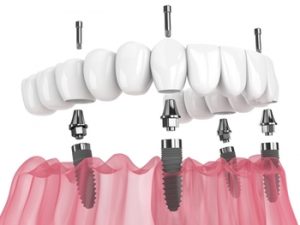When considering full-mouth dental implants, it’s crucial to understand the dental implant costs associated with this comprehensive dental treatment. In Australia, the cost of full-mouth dental implants can vary significantly, making it important for patients to explore options and understand what influences these costs.
Dental implants have revolutionised the approach to missing teeth, offering a more permanent and natural-looking solution than traditional tooth replacement options. They involve implanting a titanium post into the jaw bone, which acts as a new root for the replacement teeth. This procedure not only enhances oral health but also restores the functionality of natural teeth.
Full-mouth dental implants offer a transformative solution for those seeking to replace multiple teeth. This dental implant procedure involves placing multiple titanium implants into the upper or lower jaw to support a full set of artificial teeth. The result is aesthetically pleasing and functionally effective, allowing patients to enjoy a full range of dental activities, from eating to speaking, confidently.
In Australia, the cost of a full-mouth dental implant includes various factors, such as the quality of dental implant material, the complexity of the implant procedure, and the need for additional treatments like bone grafting. Understanding these factors is key to making an informed decision about full-mouth dental implant treatment.
It’s also essential to consider the long-term benefits of dental implants. Unlike other tooth replacement options, implants are designed to last and maintain good oral hygiene, making them a cost-effective solution in the long run. Consulting with a dental clinic working in implant surgery can provide a clearer picture of the treatment plan and associated dental implant costs.
Overview of Full Mouth Dental Implants
Full-mouth dental implants are a revolutionary solution in restorative dentistry, particularly for those with multiple missing teeth. This comprehensive treatment involves the placement of titanium implants in the jaw bone, which serve as the foundation for prosthetic teeth. Unlike single tooth implants or traditional tooth replacement options such as a tooth bridge, full mouth implants offer a more permanent solution to replacing upper or lower teeth, or even both.
 The purpose of full-mouth dental implants is to restore the functionality and aesthetics of natural teeth. They provide a stable base for new teeth, designed to match the look and feel of real teeth. The dental implant procedure is intricate, often involving steps like bone grafting if the jaw bone is not sufficiently robust. The result is a set of teeth that looks natural and allows for normal eating and speaking functions.
The purpose of full-mouth dental implants is to restore the functionality and aesthetics of natural teeth. They provide a stable base for new teeth, designed to match the look and feel of real teeth. The dental implant procedure is intricate, often involving steps like bone grafting if the jaw bone is not sufficiently robust. The result is a set of teeth that looks natural and allows for normal eating and speaking functions.
In terms of benefits, full-mouth dental implants surpass other dental treatments in several ways. They offer better oral health maintenance than traditional implants, as they prevent bone loss in the jaw and maintain the integrity of facial structures. Moreover, full-mouth dental implant treatment is known for its durability and longevity, reducing the need for frequent replacements or adjustments.
The dental implant costs, particularly for a full mouth, can be a consideration, but many find the investment worthwhile for the quality of life improvements and oral health benefits. Patients considering this option should consult with a dental clinic working in implant surgery for a detailed treatment plan and an accurate estimate of the full-mouth dental implant cost in Australia.
Factors Influencing the Cost in Australia
Several key factors significantly influence the overall cost when considering full-mouth dental implants in Australia. The complexity of dental implant procedures, the materials used, and the patient’s specific needs all play a crucial role in determining the final price.
Type of Implants and Materials
The choice of dental implants is paramount. Traditional implants, such as titanium implants, are popular due to their durability and compatibility with the human body. Alternatively, ceramic dental implants are gaining popularity for their aesthetic appeal, though they may come at a higher cost. The material choice directly impacts the dental implant costs, with some materials like titanium being more affordable than newer, advanced options.
Dentist’s Expertise and Location
The expertise of the dentist performing the implant surgery is a critical factor. Dentists with extensive experience in implantology and restorative dentistry often charge more, reflecting their high skill level and successful treatment outcomes. Additionally, the location of the dental practice plays a role. Dental clinics in major cities like Sydney or Melbourne might have higher rates than those in rural areas.
Additional Medical Procedures
Often, patients require additional procedures before dental implant placement. This could include bone grafting to strengthen the jaw bone, especially in cases of significant bone loss. Treatments for maintaining good oral hygiene and addressing other oral health issues may also add to the cost. For patients with a missing tooth or multiple teeth, the complexity of the treatment plan increases, potentially requiring more intricate implant-supported bridges or dentures.
Dental Insurance and Health Insurance
It’s also important to consider the coverage provided by dental insurance or health insurance. Some policies may cover a portion of the cost of dental implants, especially if the procedure is deemed medically necessary. Patients should consult their insurance providers and their local dentist to understand the extent of their coverage.
In conclusion, the cost of full-mouth dental implants in Australia is influenced by a range of factors, from the type of implants used to the qualifications of the dentist and additional medical procedures required. Prospective patients should consult their dental clinic for a comprehensive treatment plan and a detailed breakdown of costs.
Average Costs of Full Mouth Dental Implants in Australia
The cost of full-mouth dental implants in Australia varies considerably by region, reflecting differences in dental practice fees, local cost of living, and the availability of specialised dental services. Generally, metropolitan areas like Sydney and Melbourne tend to have higher dental implant costs due to the higher overheads in these locations. In contrast, more regional areas may offer slightly lower costs, though this can vary based on the local dentist’s expertise and the dental technology available.
On average, full-mouth dental implants in Australia can start from $20,000. This wide range is influenced by factors such as the quality of dental implant material used, the complexity of the dental implant procedure, and the necessity for additional treatments like bone grafting. The full-mouth dental implant cost typically includes consultation and treatment planning, implant surgery, the implants (often titanium implants), and prosthetic or artificial teeth.
Full-mouth dental implants represent a more significant investment than single-tooth or multiple-tooth implants (such as an implant-supported bridge). A single dental implant cost for replacing a missing tooth can start from $3,000, depending on the complexity and additional requirements like bone grafts. However, full-mouth implants offer a more comprehensive solution for those with multiple missing teeth or poor oral health, providing a long-term solution that can improve quality of life and overall dental health.
Patients should also consider the long-term benefits of full mouth implants over other tooth replacement options. These include maintaining healthy teeth alignment, preventing jaw bone deterioration, and offering a more natural look and feel compared to traditional dentures. As with any significant dental treatment, it’s advisable to consult with a dental clinic experienced in full-mouth dental implant treatment for a personalised estimate and treatment plan.
Insurance and Financing Options
Navigating the financial aspects of dental implants can be challenging. Understanding insurance coverage possibilities and available financing options can ease the burden of costs associated with dental implant procedures, especially for full-mouth dental implants in Australia.
Insurance Coverage
 Dental insurance can significantly reduce out-of-pocket expenses for dental implants. While not all insurance plans cover the full cost of dental implant surgery, many do provide partial coverage. This could include specific aspects of the procedure, like the dental implant placement or the cost of the replacement teeth. It’s crucial to consult with your dental insurance provider to understand the extent of coverage for treatments like bone grafting, implant-supported dentures, or full mouth implants. Health insurance policies may also offer some coverage, particularly if the procedure is necessary to maintain good oral hygiene or overall oral health.
Dental insurance can significantly reduce out-of-pocket expenses for dental implants. While not all insurance plans cover the full cost of dental implant surgery, many do provide partial coverage. This could include specific aspects of the procedure, like the dental implant placement or the cost of the replacement teeth. It’s crucial to consult with your dental insurance provider to understand the extent of coverage for treatments like bone grafting, implant-supported dentures, or full mouth implants. Health insurance policies may also offer some coverage, particularly if the procedure is necessary to maintain good oral hygiene or overall oral health.
Financing and Payment Plans
For expenses not covered by insurance, many dental clinics offer financing options. These might include payment plans that allow patients to pay for their dental implants over time. Such plans can be especially helpful for extensive procedures like full-mouth dental implant treatments. Financing options can vary greatly between dental practices, so discussing these with your local dentist during the consultation and treatment planning phase is advisable. Additionally, some clinics may offer specialised plans for procedures like multiple tooth implants or ceramic dental implants, which can be more costly than traditional implants.
Patients considering dental implants should also inquire about any available discounts or special programs at their nearest dental clinic. Remember, investing in dental implants, whether for a single missing tooth or full mouth restoration, improves dental health and enhances the quality of life by restoring natural teeth functionality.
Preparing for Full Mouth Dental Implants
Preparing for full-mouth dental implants is a crucial step that involves several dental examinations and consultations to ensure the best outcome. Initially, a comprehensive dental examination is conducted to assess oral health, which includes evaluating the condition of the jaw bone, existing teeth, and gums. This assessment helps in determining the suitability for dental implant surgery and the need for any preparatory procedures like bone grafting, especially if the jaw bone density is insufficient.
The timeline for the full-mouth dental implant procedure varies depending on individual cases. After the initial consultation, patients might require additional visits for preparatory treatments, such as extracting remaining damaged or decayed teeth and improving overall dental health. If bone grafting is needed, it can add several months to the timeline, as the graft must heal before the dental implants can be placed.
Once the mouth is prepared, the dental implant placement can proceed. This involves surgically inserting titanium implants into the jaw bone, serving as the foundation for the new teeth. The healing process, known as osseointegration, where the implants fuse with the jaw bone, can take several months. During this time, temporary teeth may be provided.
After osseointegration, the final phase involves attaching the prosthetic or artificial teeth to the implants. This phase may require several fittings to ensure the replacement teeth are comfortable and aesthetically pleasing.
Patients should maintain good oral hygiene throughout this process and follow all post-operative care instructions to promote healing. The entire full-mouth dental implant treatment can take six months to a year or more, depending on the individual’s healing process and specific needs. Patients considering this procedure should consult a dental clinic working in implant treatment for a detailed treatment plan and an understanding of the full mouth dental implant cost and timeline.
Aftercare and Maintenance
Post-procedure care and long-term maintenance are crucial for the success and longevity of dental implants, whether single-tooth implants, multiple-tooth implants, or full-mouth dental implants.
- Post-Procedure Care: Following dental implant surgery, following your dentist’s instructions closely is vital to ensure proper healing. This typically includes maintaining good oral hygiene to prevent infections, avoiding hard or chewy foods that could disrupt the implant site, and possibly using special mouthwashes. The initial weeks following the procedure are critical for integrating the dental implant material with the jaw bone, especially if bone grafting was part of your dental implant treatment.
- Long-term Maintenance: Regular check-ups with your dental practice are essential to monitor the health of your implants and the surrounding natural teeth. Professional cleanings and exams help maintain your dental implants and overall oral health. While dental implants are designed to be a long-lasting solution for missing teeth, they do require care similar to natural teeth. This includes brushing, flossing, and avoiding habits that could damage the implants or replacement teeth, such as smoking or grinding teeth.
- Check-ups and Adjustments: Your implants may need adjustments over time. This is particularly true for full-mouth dental implants or implant-supported dentures, as the mouth and jaw can naturally change shape. Regular visits to your dental clinic allow for timely interventions, ensuring your implants remain functional and comfortable.
Investing in dental implants, whether for aesthetic reasons or to replace missing teeth, is a significant decision. By adhering to a meticulous aftercare regime and committing to long-term maintenance, you can ensure the success and durability of your dental implants, contributing positively to your dental health and quality of life.
Alternatives to Full Mouth Dental Implants
While full-mouth dental implants offer a comprehensive solution for replacing missing teeth, they may only be suitable for some. Understanding the alternatives can help in making an informed decision.
Other Dental Restoration Options:
 Implant-Supported Bridges: These are ideal for those missing several teeth in a row. Unlike full mouth implants, they don’t require an implant for each missing tooth, making them a less invasive option.
Implant-Supported Bridges: These are ideal for those missing several teeth in a row. Unlike full mouth implants, they don’t require an implant for each missing tooth, making them a less invasive option.- Partial Dentures: These removable prosthetics are designed to replace multiple teeth and can be a cost-effective alternative to full-mouth dental implants. They are easier to adjust and repair compared to implants.
- Traditional Dentures: A conventional choice for full mouth restoration, traditional dentures are non-invasive and less expensive. However, they lack the permanence and stability of implants.
Pros and Cons Compared to Full Mouth Implants:
- Implant Supported Bridges: Pros include less surgical intervention and a shorter treatment time. However, they may not last as long as full mouth implants and require healthy adjacent teeth for support.
- Partial Dentures: They are less costly and easier to repair. On the downside, they don’t offer the same functionality and comfort as dental implants and can affect speech and eating.
- Traditional Dentures: The most affordable option, but they can lead to bone loss over time and require regular refitting. Dentures also don’t provide the same natural feel or efficiency in chewing as implants.
Conclusion
In conclusion, full-mouth dental implants offer a comprehensive solution for those with multiple missing teeth, providing benefits surpassing traditional tooth replacement options. These implants, made from high-quality dental implant material, restore natural teeth’ functionality and contribute to oral health. Though complex, the full-mouth dental implant procedure results in a set of replacement teeth that look and feel like real teeth.
While the full-mouth dental implant cost in Australia may initially seem significant, it is an investment in long-term dental health and quality of life. The costs can vary depending on factors such as the complexity of the dental implant treatment, the need for additional procedures like bone grafting, and the location of the dental practice. Nevertheless, full-mouth implants’ advantages, durability, comfort, and aesthetic appeal make them a worthwhile choice for many.
Beyond Infinity Dental offers expert consultation and treatment planning for those considering this life-changing dental treatment to ensure the best outcomes. Our team of dentists is adept in the latest dental technology and implant procedures, ensuring that patients receive the highest standard of care. If you want to restore your smile and improve your oral health with full-mouth dental implants, contact Beyond Infinity Dental at (02) 8806 3799 to schedule a consultation. Embrace the opportunity to regain your confidence with a full set of beautiful, functional teeth.
Note: Any surgical or invasive procedure carries risks. Before proceeding, you should seek a second opinion from an appropriately qualified health practitioner.
References:
researchgate.net/publication/305508522_All-on-4R_Implant_Treatment_Common_Pitfalls_and_Methods_to_Overcome_Them
healthline.com/health/dental-and-oral-health/dental-implant-procedure#seeing-a-dentist
realself.com/surgical/all-on-4
webmd.com/oral-health/dental-implants
dentaly.org/us/all-on-4-implants/









